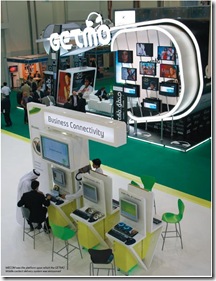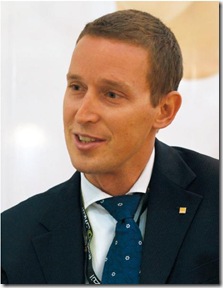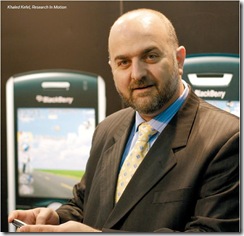The second showing of the Middle East Communications (MECOM) exhibition and conference in Abu Dhabi at the end of May was an opportunity for the region’s telecoms sector to discuss and assess the critical issues being faced by the wider community in the region. Convergence, in all of its manifestations, was a key theme and appears likely to play a critical role in the industry’s next phase of development

MECOM was the platform upon which the GETMO Middle content delivery system was announced
One of the most exciting announcements made at MECOM 2008, epitomised the importance of convergence in the telecoms industry and beyond. Arvato Middle East Sales (AMES) and Abu Dhabi Media Company, a diversified media corporation, detailed plans to form a joint venture initiative aimed at bringing digital media solutions to the Middle East and north African regions.
The joint venture will launch a series of digital entertainment services under the GETMO brand name. GETMO Arabia will be a 50:50 joint venture firm based in Abu Dhabi and will deliver digital entertainment in the region by leveraging the significant local content archive of Abu Dhabi Media Company, the global content archive of AMES and the converged digital distribution platform GETMO.
The announcement of the formation of GETMO Arabia came after the signing of a memorandum of understanding between the Abu Dhabi Media Company and the Bertelsmann Group where a number of strategic initiatives were agreed. The announcement was accompanied by a showcase demonstration of digital media services that will be deployed. GETMO Arabia will offer its partners the ability to provide their customers with a combination of music, movies, games and infotainment services. These services will be available at any time on any device ranging from mobile phones and PCs connected with broadband to set-top boxes.
“GETMO unfetters content from devices,” commented Ricky Ghai, executive director of digital at Abu Dhabi Media Company. “With Apple’s model, one is required to own an Apple device in order to access the content, but in the case of GETMO, no such restrictions exist.” GETMO Arabia will offer services direct to consumers, allowing them to download music, video, movies, games and ringtones in English, Arabic and Asian languages to their mobile phones and home computers.
GETMO will also combine its offering with affiliate programmes, sponsorships or advertising campaigns of partner companies. “Content development, aggregation and delivery are becoming an important part of value creation in a changing media world,” stated Ghai. “So much so that it is transcending the media sector and that is part of the reason we were at a show like MECOM, where many of the exhibitors are network and telecoms providers.” Abu Dhabi Media Company is state-owned, having launched last June with an estimated capital of AED100 million (US$27 million).
Coming to a small screen near you
In a quest to raise consumer spending and develop innovative content services, telecoms operators should focus on their core business and partner with media firms, according to the head of new media at MBC Group, Ammar Bakkar. Bakkar believes that creating content requires a completely different mindset and investment strategy, compared to developing and marketing basic voice and data services.
“Partnerships with media companies seem more productive because they have already established their brand in the content association with people,” Bakkar said. “Users know media companies as the channel to receive premium content. Developing a new brand by operators will be a very difficult situation, so a partnership in my opinion is the solution.”
The Arabic language broadcaster is currently producing a 30-episode comedy series specifically for mobile handsets, which even for an established multimedia company brings new challenges.
“The experience wasn’t easy,” Bakkar admitted. “We found out that writing for mobile was different because you have to enjoy the comedy in only four minutes, you need to zoom in all the time, and also use different types of cuts to make the file light.”
Outsourcing gains
If the irrefutable march of convergence in the telecoms space was one recurring theme of MECOM 2008, another was the question of managed and outsourced services. It is a concept that has existed in one form or another for many years, but in the telecoms space in the Middle East, it has truly reached its true definition as heightened competition forces service providers and corporations in general to focus on their core businesses.
“In the provision of IT solutions, in many instances, there currently exists the problem of choice and subsequently an integration nightmare,” commented Akshay Lamba, former telecoms lead at KPMG. “What is required is the establishment of a strategic partnership relationship with as few trusted solutions partners as possible, rather than with a series of vendors.”
Akshay proposed three realms of outsourcing, namely – core processes, non-core processes and go-to-market initiatives. He identified that the greatest impact comes from a strategic partner that can be aligned with a business objective and is able to deliver core processes for an organisation at a higher efficiency platform.
Lamba is also a big believer in the availability of localised support and resources, which is to say IT solutions providers that have invested in building thought leadership and resources in the local market place on which their enterprise clients can depend. “There is a real opportunity for large local firms to deliver thought leadership and subsequently build credibility with their key customers,” Lamba claimed. “And this goes back to the building of a lasting relationship, a partnership in which both organisations are driven to reach a common goal and bring out the greatest efficiencies in each other.”
With a background of having envisaged and delivered such strategic partnerships in the telecoms and banking arena in markets across the globe, Lamba is in little doubt that innovative business and financial models are the keys to success in the space of long term strategic IT partnerships. He stressed that at the end of the day these partnerships are based on a strong foundation of mutually beneficial commercial models and the technology stack plays the role of enabler and accelerator for the business.
Turning orange with envy
“Growth is possible for incumbent operators,” stated Philippe Vogeleer, chief strategy officer for Orange Jordan. “Yes indeed, new shiny companies can achieve significant results, but so can we.”


Left: Ricky Ghai, Abu Dhabi Media Company, Right: Philippe Vogeleer, Orange Jordan
Never one to shy away from speaking his mind, Vogeleer disagreed with the proposition that it is impossible for those with a state or ministerial background to transform a company into a nimble, commercially minded organisation.
“Everybody says you should go greenfield, take new assets only and the like. But because the incumbents you are talking about are ready to change, you can make pretty significant leaders out of former monopolies,” Vogeleer asserted.
Growth is not only evident with Orange Jordan, which has used its brand as a tool to improve its image in the market, but with others incumbents such as Etisalat. “We had four brands, four different images served by four different types of people. Typically the average age of our mobile service was 27, while the average age in our fixed business was 47. These people had very different life experiences, and therefore had a very different way of treating and serving clients,” Vogeleer explained, describing the company’s three-year rebranding strategy, which commenced in the spring of 2007.
Vogeleer insisted that Orange’s piecemeal rebranding process has suited the Jordanian market as it has created a single identity from the four separate brands that the population was familiar with. While some branding experts suggest a “big bang” approach to rebranding, Orange Jordan’s management remains satisfied with its decision to spend more time in communicating the benefits of the new brand and vision.
“We thought our approach was better because we were already in Jordan, we were the largest communications provider and everyone knew us, so why would we want to kill some of our assets?,” Vogeleer contended. “We decided what we needed to do was to progressively communicate our new message, so that people would gradually see the brand – and gradually absorb the assets of the other brands we had. As far as I know, this has been one of the longest re-branding programmes ever undertaken, but one of the most successful as well.”
Going where the growth is
Wael El-Kabbany, vice president of business development for Middle East and Africa at BT says that with a 60 per cent growth rate in the region last year, the MEA has emerged as a key location for the UK telco. El-Kabbany describes BT as being in a ‘pull phase’, where its network solutions are coming very much in line with the aspirations of local companies and major enterprises planning to go international.
“This year at MECOM our value-added-proposition was business continuity. All of our clients have critical connectivity or communication requirements, and what we are trying to demonstrate is how to keep that platform up and running with minimum disruptions,” El-Kabbany stated.
Operating in 170 countries, BT is in a good position to assist national businesses extend their reach beyond their own borders, by providing the right network and infrastructure backbone. “The message we hear all the time from the local market is ‘we are expanding’, ‘we are going regional or global’,” El-Kabbany said. “But for a company to go regional or global, it has to change a lot of the ways it does business. It has to rely a lot more on global suppliers.”
Prior to MECOM, BT’s global advisory board met in Dubai for its annual board meeting, a destination chosen in preference to 169 other markets. “We are going where our growth is coming from and it proves our commitment to the region in which we are operating,” El-Kabbany commented.
Europe and the US remain the telco’s anchor markets where most of its existing revenue and profitability is generated, though it is keeping a close watch on the MEA region as many of its multinational clients set up local offices. “Remember, we are in a service industry so we go where are our customers go, and most of those customers are coming to the Middle East,” stated El-Kabbany. BT also does business with over 95 per cent of the telcos in Africa and carries a quarter of all of Africa’s telecoms traffic between African countries as well as the rest of the world.
Securing BlackBerry

As enterprise solutions become more widespread and remote access to corporate networks is established as a standard by large corporations, Khaled Kefel, director of sales for the Middle East, Research In Motion (RIM), has been evangelising the importance of ensuring data security in a mobile environment and the implications for users of BlackBerrys in particular.
Khaled Kefel, Research In Motion
He believes that traditional corporate security boundaries need to be expanded in order to match the new mobile communications reality. Research indicates that the average BlackBerry user processes 2,750 emails and 1,444 phone calls while on the move each year, meaning there are vast amounts of confidential and business-critical data passing back and forth over wireless networks.
“Smartphones operate largely outside corporate firewalls while maintaining an almost constant connection to corporate networks. Given these facts, network integrity and data protection are seen by RIM as being of paramount importance,” Kefel stated.
The UAE’s second service provider, du, chose MECOM to announce it was ready to allow its subscribers to utilise BlackBerry devices, having signed a distribution agreement with Alcatel- Lucent to provide integration and service deployment. The BlackBerry solution offered by du will be available on enterprise and consumer postpaid lines and enterprise prepaid lines, with consumer prepaid lines to follow in the near future.
Reaching out to the community
A robust area of discussion during MECOM was with regards the importance of operators engaging the community and recognising the positive contributions that corporates can make in improving the standard of living of local people.
Ross Cormack, CEO, Nawras, revealed some of the operator’s community initiatives, which have included the ‘goodwill convoy’ that took place during the holy month of Ramadan last year. The programme involved a convoy of vehicles visiting a number of community institutions and organisations, as well as other less fortunate people around the sultanate.
“Over a 10-day period our teams drove some 5,000 kilometres in four-wheel-drive vehicles around the countryside, doing all sorts of things for the institutions,” Cormack recalled. “From constructing buildings and providing coaches in some instances; to supplying IT centres and digital communications or whatever was needed at that institution.”
Cormack noted that the campaign was not only a success in terms of assisting the community, but also in terms of developing trust and building morale amongst Nawras employees.
Orange Jordan’s Vogeleer, said his company used its branding exercise as a way of connecting with Jordanian youth and families and creating national pride. “We devised social activities for people. We wanted to convince people that Orange was coming and that it was actually a positive thing for them,” Vogeleer recounted.
These activities included school visits and the creation of an iconic character and clothes that read “All for Jordan”, “Hello Jordan” and “Welcome to Jordan”, which children could own for themselves.
“Kids who could not afford good clothing could actually receive top-notch garments offered by Orange for free and which did not even mention our company name.”
The company also provided buses and Bedouin tents hosting PCs and wireless Internet access, where locals who did not have email addresses could vote for the ‘seven wonders of the world’ campaign and also received the Orange-branded clothing.
“The idea was that everyone would be doing something for the country and we created that sense of unity around the brand.”





0 comments ↓
There are no comments yet...Kick things off by filling out the form below.
Leave a Comment